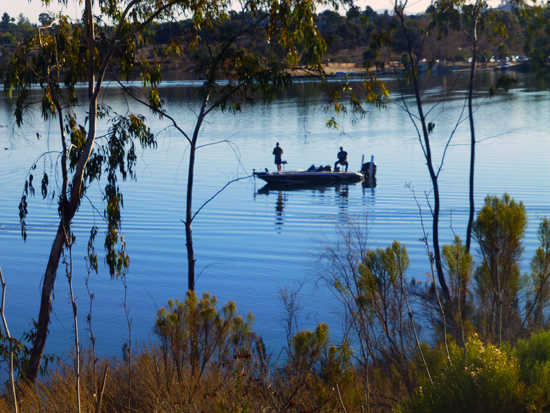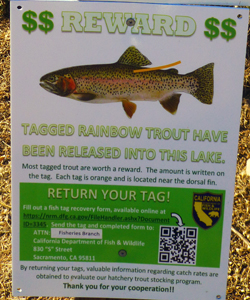
By Donald H. Harrison

SAN DIEGO–California has a different kind of lottery than the one with numbered ping pong balls which can be watched on television on a regular basis. This one is played without such fanfare by a relatively small percentage of our population — the people who buy licenses to enjoy fishing in our freshwater streams, rivers and lakes.
Invitations from California’s Department of Fish and Game to participate in a rainbow trout game can be found posted at various entrances to Lake Murray, where I like to walk, and I suppose at other area lakes and streams as well. The way it works is this: if you catch a fish, and it has a tag number, you file a report that can be downloaded from the California Department of Fish and Game website.
The information about the fish — its length, its location, the date and time of day it was caught, whether it was kept or released, whether it was caught with bait or a lure, and whether it was from the shore or from a boat — is sent along with the tag to the Department of Fish and Game in Sacramento.
In response to the return of the tag with the filled-out form, the Department then sends back to the anglers a check for the amount mentioned on the tag. A typical reward is $10, but I’m told they go even higher.
With fishing licenses costing $8 a day at Lake Murray, this is hardly the kind of payoff that one might get at an Indian gaming casino, or at the Del Mar Racetrack, but then one doesn’t really enter this lottery for the sake of winning money. The joy is in catching fish. The prize money, if it is actually won, is just a fortuitous extra.
Like many of my readers who also have computers and email accounts, I was besieged the last few days with “Last Chance” messages that warned it was my last chance for me to donate to this or that cause, and still be eligible for a charitable tax deduction in 2013.
As I sent e-message after e-message of this type to my e-wastebasket, I thought to myself, ‘Oh, I know these charities really will give me other chances.” And I wondered whether charitable organizations generally–and Jewish organizations specifically–couldn’t come up with a better way to persuade people to cheerfully donate money, rather than making these desperate-sounding last minute appeals.
We have two holidays which are associated with cheerful gambling–Purim and Chanukah. Purim, which celebrates Queen Esther saving her fellow Jews from an evil decree by Haman, the vizier to King Ahasuerus, remembers that the date Haman chose for the annihilation of the Jews was selected by lottery. So, in celebration of the frustration of his efforts, it would seem a community-wide lottery might be appropriate.
Chanukah, of course, gives us another opportunity with a game that might be modeled on dreidel spinning.
So, with the fishing lottery in mind, here’s what might be done — and please, don’t any of you say that the idea sounds “fishy.” It’s intended to raise money for our agencies and build community spirit at the same time.
Anybody who contributes money to a recognized 501-c-3, Jewish institution–be it a synagogue, a community agency, a defense agency, a movement, or educational program –would receive in addition to the regular benefit that organization offers a numbered entry form that could be filled out and sent to the community-wide Purim or Chanukah lottery. As in the fishing contest, the form could be structured and tabulated, perhaps with information helping our community to gain insight into the people who are drawn to Jewish causes.
There could be one drawing for Purim, and a big spin of a dreidel-shaped wheel (or wheels) on Chanukah, and those holding the winning ticket numbers would receive prizes that had been solicited for the occasion from businesses wishing to identify themselves with the local Jewish community.
Such events could attract numerous participants, some of whom may hold multiple tickets — having been incentivized to contribute to more than one charity as a way to increase their chances to win a major prize.
One can imagine these events being held with appropriate merry making at large venues with celebrity hosts. With proper consultation with law enforcement, to make certain these events conform with all applicable state laws, a recognized and respected agency of our community– perhaps the Jewish Community Foundation–could administer the whole shebang in our people’s behalf.
*
Harrison is editor of San Diego Jewish World. He may be contacted at donald.harrison@sdjewishworld.com . On behalf of all writers and of San Diego Jewish World, he would like to wish all our readers a very happy, prosperous and healthy New Year!
